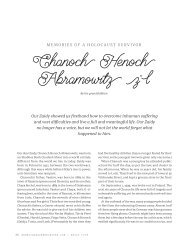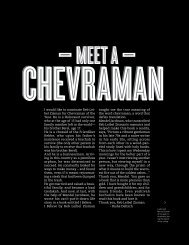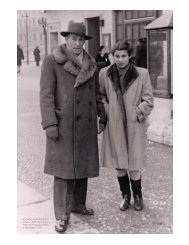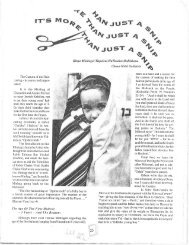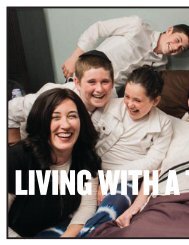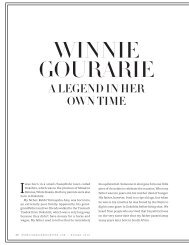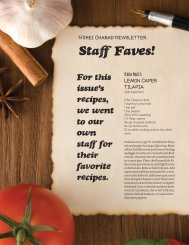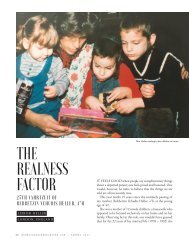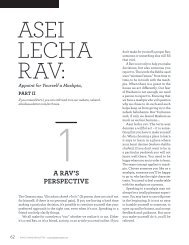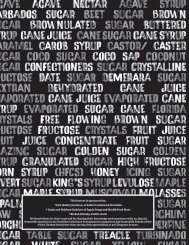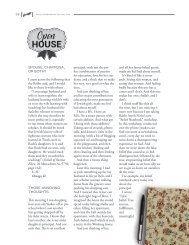DD
Create successful ePaper yourself
Turn your PDF publications into a flip-book with our unique Google optimized e-Paper software.
50 nsheichabadnewsletter.com<br />
Musia with Esther
DELVING<br />
DEEPER<br />
February 2017<br />
51<br />
THE<br />
OBEDIENT<br />
CAMPER<br />
A STORY OF PPD RECOVERY<br />
Musia Baumgarten<br />
IT<br />
It was just like summer<br />
camp. At breakfast, lunch,<br />
and dinner, I dutifully ate<br />
what was served to me. Various<br />
activities were available<br />
whenever I desired, and I followed the<br />
instructions I was given for each one.<br />
Playing board games, watching a video,<br />
sitting outside in the sunlight, going for<br />
walks, and even trips to the grocery. I<br />
followed every directive, just as every<br />
good camper should. Except it wasn’t<br />
summer camp. And I wasn’t 14 years old.<br />
I was 21, a married woman, and had<br />
recently given birth.<br />
Following a typical pregnancy and<br />
normal labor and delivery, my husband<br />
and I became parents to a healthy baby<br />
boy. I was overjoyed and overwhelmed<br />
at the awesomeness of bringing another<br />
soul into the world—my baby! Thankfully,<br />
my two days in the wonderful<br />
Staten Island University Hospital passed<br />
by quickly, and before long, on a cold<br />
Friday in December, I was on my way to<br />
recover at my parents’ home in Crown<br />
Heights.<br />
(On that very same day, about an<br />
hour’s distance from me, over the Verrazano<br />
Bridge in New Jersey, my sister<br />
gave birth to her fourth child, a beautiful,<br />
healthy girl! Nothing could have<br />
bonded us more than raising newborns<br />
at the same time.)<br />
My first few days and nights as a new<br />
mother passed uneventfully. Though I’m<br />
not sure exactly when, at some point<br />
things changed. It began with my loss
52 nsheichabadnewsletter.com<br />
of appetite. As an admitted foodie<br />
that’s very strange for me. My parents<br />
and my husband, Aizik, prepared<br />
meals for me and I simply ate what I<br />
was served. Not because of a desire to,<br />
but simply because I was instructed to. I<br />
wondered about the loss of appetite but<br />
did not reach any conclusions.<br />
Next I noticed a change in my emotions.<br />
It began with the feeling of being<br />
totally overwhelmed. Every time my precious<br />
little boy fell asleep, I thought of<br />
everything that had to be done and wondered,<br />
“What should I do now?” A list<br />
composed itself in my brain, each item<br />
fighting for priority placement. Eat,<br />
POSTPARTUM<br />
DEPRESSION<br />
Women can experience many<br />
symptoms of postpartum<br />
depression due to normal<br />
hormonal changes, the stress<br />
of giving birth, or just caring<br />
for a new baby. These postpartum<br />
blues characterized<br />
by emotional ups and downs<br />
in the first weeks after<br />
birth are normal. However,<br />
if symptoms are severe or<br />
last longer than two weeks,<br />
then further evaluation is<br />
needed. Many women suffer<br />
with postpartum depression<br />
either because they are<br />
ashamed or do not realize<br />
they need help. Getting help<br />
sooner can relieve symptoms<br />
and make it easier to cope.<br />
How long after giving birth<br />
is a woman at risk for PPD?<br />
Medical opinions vary, but a<br />
woman is typically considered<br />
postpartum for up to 12<br />
months following childbirth.<br />
Postpartum depression<br />
symptoms can begin anytime<br />
during this first year<br />
after birth.<br />
How common is PPD? It is<br />
estimated that 13% to 19% of<br />
women experience postpartum<br />
depression. However,<br />
many women have a hard<br />
time recognizing their condition<br />
or feel ashamed to<br />
admit how they are feeling,<br />
which results in an underreporting<br />
of symptoms. What<br />
are the risk factors for PPD?<br />
Anybody can come down with<br />
PPD, and there are not necessarily<br />
any external causes.<br />
However, a personal history<br />
of depression, anxiety,<br />
or postpartum depression,<br />
a disappointing birth experience,<br />
adjusting to a new<br />
body, trouble with nursing,<br />
marital stress, financial<br />
stress, lack of support in<br />
caring for children, having a<br />
thyroid imbalance, having any<br />
form of diabetes (type 1, type<br />
2 or gestational), or having a<br />
major recent life event such<br />
as loss of a loved one, house<br />
move, or career change, can<br />
increase the chance of experiencing<br />
PPD. What are the<br />
symptoms of PPD? A woman<br />
may feel any of the following<br />
for a period lasting longer<br />
than two weeks:<br />
• Changes in appetite or<br />
weight<br />
• Anxious, irritable, and<br />
angry<br />
• Difficulty concentrating<br />
or sleeping<br />
• Sleeping too much or<br />
too little<br />
• Feeling tired or lack of<br />
energy<br />
• Crying spells<br />
• Overwhelmed or feelings<br />
of guilt<br />
• Unable to care for baby<br />
• Trouble bonding with<br />
baby<br />
• Feeling like a failure as<br />
a mother<br />
Though not very common,<br />
some women can experience<br />
postpartum psychosis, which<br />
can lead to thoughts of selfharm<br />
or thoughts of hurting<br />
others. This is a medical<br />
emergency and a call to a<br />
medical provider, or, if not<br />
available, an ambulance is<br />
advised.<br />
Treatment: Treatment<br />
for PPD can include medication,<br />
therapy, and referral to<br />
community resources that<br />
offer additional support. It<br />
is important to remember<br />
that evaluation by a medical<br />
provider is needed to<br />
rule out other medical conditions<br />
that can have similar<br />
symptoms to PPD. Alternative<br />
therapies and self-care<br />
are helpful adjuncts to<br />
medical care.Support for<br />
Mothers: Postpartum Support<br />
International has a<br />
toll free hotline that offers<br />
support and guidance for<br />
women in need of postpartum<br />
depression support<br />
and services. They can be<br />
reached at 1.800.944.4773 or<br />
www.postpartum.net<br />
Guidance for family member<br />
or friends:<br />
Encourage rest, exercise,<br />
and good nutrition<br />
Ask what support is<br />
needed and provide it if<br />
possible<br />
Advise seeing a medical<br />
professional<br />
Support the use of medications<br />
if needed<br />
Remember that postpartum<br />
depression is not<br />
anyone’s fault, sometimes it<br />
just happens<br />
Learn about postpartum<br />
depression and other<br />
perinatal mood and anxiety<br />
disorders<br />
Stay positive, this is temporary,<br />
she will recover!<br />
Compiled by Chaya Sarah<br />
Naiditch BSN, RN, using<br />
information from Postpartum.net,<br />
Uptodate.com, and<br />
the book Postpartum Mood<br />
and Anxiety Disorders: A Clinician’s<br />
Guide by Beck and<br />
Driscoll.
February 2017<br />
53<br />
Esther<br />
sleep, shower, care for my body that<br />
was still recovering from the birth. Or<br />
should I first shower, then eat? I was<br />
completely distraught. Where to start<br />
and where to end? Making a decision on<br />
my own was more than I was capable of.<br />
Instead, Aizik and my parents planned<br />
my schedule for me. I vaguely remember<br />
following instructions in between<br />
my tears of frustration. Not a very good<br />
camper…<br />
I recall being in a particularly emotional<br />
state and telling Aizik that I<br />
thought it was more than just ordinary<br />
post-baby hormones. I asked<br />
aloud, “Could this be postpartum<br />
depression?” But really, what did any<br />
of us know? So I made my comment,<br />
my husband listened, and my tears<br />
continued.<br />
By then it was time for my baby’s<br />
first visit to the pediatrician. This was<br />
quite a milestone for me; I was so<br />
proud to be bringing my son to our<br />
family physician, Dr. Elie Rosen, who<br />
had cared for me and my siblings when<br />
we were babies. My mother accompanied<br />
me for the visit. He took one look<br />
at me and said to my mother, “Tzirl,<br />
forget the baby for a second. Musia<br />
looks terrible.”<br />
I burst into tears. Dr. Rosen had<br />
been my doctor since infancy and knew<br />
me well. He was 100% right, I did look<br />
terrible, because I felt terrible.<br />
With his endless patience, Dr. Rosen<br />
asked me a few questions which I<br />
answered between sniffles. The pain<br />
and bewilderment were plain to see,<br />
but I could not pinpoint the source.<br />
At the end of our conversation, I was<br />
given strict instructions to come back<br />
to see him if I didn’t start feeling better<br />
soon.<br />
Weeks passed and I wasn’t feeling<br />
any better. While my little boy slept<br />
peacefully in my lap, tears would shake<br />
my body—for no apparent reason. I<br />
clearly recall sitting in a rocking chair<br />
in my parents’ living room, my son fast<br />
asleep in my arms, an angelic look about<br />
him, but I just could not stop crying.<br />
Day after day my husband would<br />
find me this way and call my mother,<br />
“Shviger, she’s crying again.” (Because<br />
what’s he supposed to do when his wife<br />
of all of nine months won’t stop crying?<br />
Our poor innocent husbands are just not<br />
prepared for this!) So my mother would
54 nsheichabadnewsletter.com<br />
Top: Zelig<br />
Bottom: Sholom<br />
sit beside me, stroke my back, and hand<br />
me tissues as my tears continued to flow.<br />
It was then that I researched postpartum<br />
depression and began to understand<br />
what was taking place in my body.<br />
It was all very overwhelming. Everything<br />
was difficult: getting out of bed,<br />
dressing myself, eating, and feeding the<br />
baby, especially because breastfeeding<br />
was so challenging. With Dr. Rosen’s<br />
guidance and the support of my husband,<br />
I switched to bottle feeding,<br />
which I found less stressful to deal with.<br />
Three weeks passed. I pulled tissue<br />
after tissue from the box next to my<br />
rocking chair. At the same time, unbeknownst<br />
to me, my mother plotted my<br />
recovery.<br />
“The baby is in the stroller ready to<br />
go out. Here’s your coat. Go for a walk<br />
with Aizik and get me a few things from<br />
the store,” she would say sweetly. So off<br />
we went.<br />
“Dr. Rosen said you need sun. Put on<br />
my fur and come sit on the back porch<br />
where it’s sunny.” It was the beginning of<br />
winter and starting to get cold, but that<br />
didn’t matter. Robotically, I followed my<br />
mother’s every cue and instruction.<br />
My mother’s persistence in getting me<br />
up and about played a key role in my<br />
recovery. A wise nurturer, she saw what I<br />
was dealing with and her support, counsel,<br />
and guidance took me a long way.<br />
But my mother’s persistence wasn’t<br />
enough. One day my father informed<br />
me that I had another appointment<br />
scheduled with Dr. Rosen. Clearly, I<br />
wasn’t getting any better and I needed<br />
help. During this visit, Dr. Rosen gave<br />
me the official diagnosis of mild PPD.<br />
I was advised to either take medication<br />
or wait it out, for recovery on my own<br />
would be possible. His advice was to<br />
take the antidepressants, and because I<br />
did not want to feel this heavy, bewildering<br />
sadness any longer, I agreed.<br />
I spent another few weeks at my<br />
parents’ and then the time arrived for<br />
my little family to go back to our own<br />
apartment. I don’t recall exactly who<br />
made dinner for me each night, or how<br />
many times my mother came to check<br />
on me every day, but I was very grateful<br />
for everyone’s kindness. I do recall feeling<br />
absolutely terrified at the thought of<br />
being home alone with my baby. Would<br />
I do right by him? Would I know how to<br />
handle any challenge that arose? What<br />
if I failed? G-d bless my husband who<br />
took our son to shul with him many,<br />
many mornings.<br />
People ask me how long it took me to<br />
recover fully, and the truth is that I don’t<br />
really know. It took a while for the terror<br />
of being home alone with the baby to<br />
go away, but it eventually did go away.<br />
Whenever I was home with the baby for<br />
a long period of time, or if I went out<br />
with him by myself, I felt like I had completed<br />
a cross country triathlon!<br />
The thing with PPD is that you don’t<br />
know when it’s going to hit you again.<br />
So I would ride the wave of happiness<br />
and accomplishment for as long as I<br />
could. Every so often, though, the wave<br />
crashed and I was left feeling completely<br />
helpless, overwhelmed, and utterly incapable<br />
of caring for my son.<br />
I was also afraid of the future and I<br />
wondered if the PPD would return after<br />
future pregnancies. It didn’t take long<br />
for me to, fortunately, become pregnant<br />
again and find out.<br />
I continued to suffer from PPD with<br />
my second and third babies. My husband,<br />
my parents, and my in-laws were<br />
better prepared and knew what to do.<br />
As in any challenging situation a<br />
strong support system is necessary. I<br />
am fortunate to have that, including the<br />
right therapist. My desire to share my<br />
story is rooted in the knowledge that in<br />
reading this, people who are similarly suffering<br />
can feel supported, know they are<br />
not alone, and will seek the right help.<br />
May we all be zocheh to be healthy in<br />
mind and in body, and to raise a new<br />
generation that is aware of and can<br />
openly discuss their challenges in order
February 2017<br />
55<br />
to reach resolutions in a timely and well-supported manner.<br />
Musia Baumgarten and her husband Aizik are the program<br />
directors of Chabad of East Hampton, NY. Musia shares this<br />
story hoping to eliminate the stigma attached to PPD.<br />
FOR ALL YOUR SPEECH NEEDS,<br />
VISIT SHULA BRYSKI'S<br />
For all your speech needs, visit Shula Bryski's<br />
www.rentaspeech.com<br />
www.rentaspeech.com<br />
Do you have a story to tell with a valuable<br />
lesson or a personal reflection that may<br />
resonate with our readers? If you have not yet<br />
been published, and don’t know if you ever will<br />
be, but know deep down that you have something<br />
valuable to share, Delving Deeper is for you!<br />
The Lubavitcher Rebbe taught, “If you know<br />
Aleph, teach Aleph.” Each of us has something<br />
of value to share with others. And we can all<br />
benefit from hearing about what others have been<br />
through, and what they have learned from their<br />
life experiences, many of which are different<br />
from anything we have ever imagined! It is the<br />
hope of the column’s curator, Yonit Tanenbaum<br />
of YQ Media, that each article printed in this<br />
series will encourage readers to further know,<br />
understand, respect, and love one another. Email<br />
delvingdeeper.nshei@gmail.com with your story<br />
today.<br />
We offer WE pre-written OFFER PRE-WRITTEN and custom AND speeches<br />
for all occasions!<br />
CUSTOM SPEECHES FOR<br />
ALL OCCASIONS!<br />
We also edit large projects and smaller writings including books, blogs, websites, presentations,<br />
newsletters, letters, articles, essays, speeches, ads and e-mails. We will make sure your writing is<br />
free of grammar errors and typos. We are also happy to help you with the content and progression.<br />
We also edit large projects and smaller<br />
writings including books, blogs, websites,<br />
presentations, newsletters, letters, articles,<br />
essays, speeches, ads and e-mails. We will make<br />
sure your writing is free of grammar errors<br />
and typos. We are also happy to help you with<br />
the content and progression.<br />
Get a<br />
FREE GIFT SUBSCRIPTION*<br />
to N’shei Chabad Newsletter<br />
for your sister, neighbor or friend!<br />
SUBSCRIBE or RENEW<br />
between Tu B’Shvat & Purim.<br />
Call or order online<br />
718.771.7648 or 917.822.8359<br />
nsheichabadnewsletter.com/subscribe<br />
Bais Chaya Mushka Seminary<br />
wishes Mazel Tov to our<br />
graduates and staff on their recent Simchas.<br />
Marriage<br />
Goldie Junik to Dovi Lepkivker<br />
Chanie Avraham to Shimon Alon<br />
Mushky Goldshmid to Mendel Naparstek<br />
Lysa Cohen to Shneor Zalman Meir Bueno<br />
Baby<br />
Naftoli & Rochel Charytan (Yarmush) – boy<br />
Shmuel & Shainy Edelman (Blau) – girl<br />
Dovid & Zahava Lubecki (Taieb) – girl<br />
Mendel & Shaina Gourarie (Lison) – girl<br />
Mendy & Chaya Mushka Drookman (Morozow) – girl<br />
Mendy & Esther Markowitz (Edelman) – girl<br />
Schneur & Chaya Yecheilov (Ceitlin) – girl<br />
Shalom & Rivka Gniwisch (Soussan) – girl<br />
Chaim & Chaya Mushka Shcherbina (Grinker) – girl<br />
Yecheskel & Nechamie Raeburn (Rothman) – boy<br />
Avrohom Chaim & Esty Stern (Altein) – girl<br />
Schneur Zalman & Faige Rabin (Bronstein) – girl<br />
Yaakov & Mushkie Perlman (Kohn) – bo<br />
Shaya & Fruma Spielman (Morrison) – girl<br />
Getzy & Chana Rubashkin (Yusevitz) - girl<br />
Please update your Mazel Tovs on http://theseminary.ca/mazel-tov/<br />
BCMS • 5115 Vezina Ave, Montreal, Quebec H3W 1C2<br />
Tel: (514) 733-2221 • Fax: (514) 733-5051<br />
*New subscribers in the US 0nly




